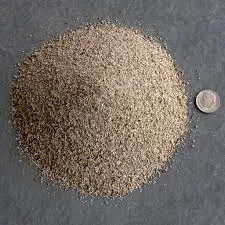Jan . 02, 2025 07:00 Back to list
high quality perlite or vermiculite
The Benefits of High-Quality Perlite and Vermiculite in Gardening
When it comes to gardening and horticulture, the choice of soil additives can significantly influence the growth and health of plants. Among these additives, high-quality perlite and vermiculite stand out for their unique properties that enhance soil structure, aeration, and moisture retention. Understanding the differences and advantages of these two materials can help gardeners make informed decisions for their plants.
What is Perlite?
Perlite is a naturally occurring volcanic glass that, when heated to high temperatures, expands to form lightweight, white granules. This change in structure transforms it into a valuable soil amendment used for improving drainage and aeration. The particles are porous, which allows air and water to penetrate the soil, promoting healthy root development.
Benefits of Perlite
1. Improved Drainage One of the most significant advantages of using high-quality perlite in soil mixes is its ability to enhance drainage. This is particularly beneficial for plants that prefer well-draining soil, like succulents and cacti. By preventing waterlogging, perlite helps to avoid root rot and other related diseases.
2. Aeration The lightweight and porous nature of perlite creates air pockets within the soil, ensuring that roots receive the necessary oxygen. This aeration is critical for optimizing plant growth and overall health.
3. Neutral pH Perlite has a neutral pH, making it suitable for a variety of plants. It does not alter the pH of the soil, allowing gardeners to maintain the optimal growing conditions for their specific plants.
4. Lightweight Addition Being significantly lighter than many other soil amendments, perlite is easy to handle and transport. This characteristic is particularly advantageous for container gardening, where heavy soil can be cumbersome.
What is Vermiculite?
high quality perlite or vermiculite

Vermiculite is a naturally occurring mineral that, when heated, expands and is transformed into worm-like granules. Like perlite, vermiculite is used to improve soil quality but has different properties that make it unique.
Benefits of Vermiculite
1. Moisture Retention One of the standout features of high-quality vermiculite is its capacity to retain moisture. This characteristic makes it an excellent choice for plants that thrive in consistently moist conditions. Vermiculite can hold several times its weight in water, ensuring that plants have a steady supply of moisture.
2. Nutrient Retention Unlike perlite, vermiculite has the ability to absorb and hold essential nutrients. This nutrient retention means that as water moves through the soil, it carries vital minerals to the plant roots, enhancing growth and development.
3. pH Neutrality Similar to perlite, vermiculite is also pH neutral, which means it won’t adversely affect the acidity or alkalinity of the soil.
4. Lightweight and Easy to Use Like perlite, vermiculite is lightweight, making it easy to mix into potting soils and to transport. This quality is essential for container gardening and raised beds.
Choosing Between Perlite and Vermiculite
The choice between high-quality perlite and vermiculite often depends on the specific needs of the plants being grown. For gardeners looking to enhance drainage and aeration, perlite is the way to go. In contrast, for those with moisture-loving plants, vermiculite is a better option due to its remarkable moisture and nutrient retention abilities.
In conclusion, both high-quality perlite and vermiculite offer significant benefits to gardeners looking to improve soil quality. Understanding their unique properties allows for better soil management and ultimately leads to healthier, more robust plants. By incorporating these materials appropriately, gardeners can create an ideal growing environment that meets the specific needs of their beloved plants.
-
Fe-C Composite Pellets for BOF: Enhance Steelmaking Efficiency
NewsAug.07,2025
-
Eco-Friendly Granule Covering Agent | Dust & Caking Control
NewsAug.06,2025
-
Fe-C Composite Pellets for BOF: High-Efficiency & Cost-Saving
NewsAug.05,2025
-
Premium Tundish Covering Agents Exporters | High Purity
NewsAug.04,2025
-
Fe-C Composite Pellets for BOF | Efficient & Economical
NewsAug.03,2025
-
Top Tundish Covering Agent Exporters | Premium Quality Solutions
NewsAug.02,2025
